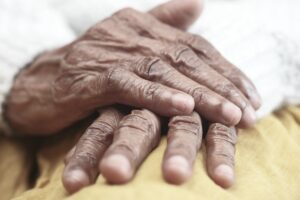What is arthritis?
Arthritis is the inflammation and soreness of one or more joints. The main symptoms associated with arthritis are joint pain and stiffness, which typically gets harsher with age. The most common types of arthritis are osteoarthritis and rheumatoid arthritis, however there are many more.
Osteoarthritis

Osteoarthritis is the general type of arthritis diagnosed in the UK. Proved to be affecting nearly 9 million people. It initially affects the smooth cartilage lining of the joint. This makes movement more complicated than usual, leading to pain and stiffness. Once the cartilage lining starts to roughen and thin out, the tendons and ligaments have to work harder. This can cause swelling and the formation of bony spurs called osteophytes. Severe loss of cartilage can lead to bone rubbing on bone, altering the shape of the joint and forcing the bones out of their normal position.
The general affected joints:
- Knees
- Hands
- Hips
- Spine
Rheumatoid
With Rheumatoid arthritis, the body’s immune system targets affected joints, which leads to pain and swelling. The outer layer of the joint is the first place affected. This can then spread across the joint, leading to further swelling and a change in the joint’s shape. This can cause the bone and cartilage to break down. People with rheumatoid arthritis can often develop problems with other tissues and organs in their body. It has been found that there is over 400,000 people with Rheumatoid arthritis, substantially less than Osteoarthritis but just as bad.
How arthritis affects people
Severe arthritis mostly affects the hands or arms which can make it difficult for one to carry out daily tasks. Weight-bearing joints with arthritis can prevent one from walking comfortably or sitting up straight. In certain cases, joints may gradually lose their alignment and shape.
Symptoms

The most common signs and symptoms of arthritis involve the joints. Depending on the type of arthritis, the signs and symptoms may include:
- Pain
- Stiffness
- Swelling / inflammation
- Redness
- Decreased range of motion of the joints
- Joint pain
- Tenderness
- Warm red skin over the affected joint
- Weakness and the destroying of the muscle
The new arthritis drug
What is the drug?
The drug is called baricitinib or tocilizumab. It is used to treat arthritis, helping to reduce pain and inflammation.
Trial and testing
The trial has recruited more than 2,000 Covid patients in 15 countries to assess the potential benefits of tocilizumab and other immune system-modulating drugs such as baricitinib, sarilumab, anakinra and interferon. Scientists on the trial released the early results after an analysis of the first 303 patients. They were randomised to receive treatments such as tocilizumab or no immune modulator and found an improvement in those receiving the drug. But the nature of the improvement is far from clear because scientists have yet to disentangle whether the drug boosted survival rates, shortened time in intensive care, or both. It was found that 13% fewer severely ill patients died of covid when treated with the arthritis drug baricitinib, compared to existing treatment options. So, continuing the trial data, the drug will be on the road to becoming the next effective therapy for the sickest patients with covid.
More about the Arthritis drug
The drug used to treat rheumatoid arthritis has been found to improve survival rates of hospitalized Covid-19 patients. The arthritis drug works by reducing inflammation caused by Covid-19 and blocks signals to the immune system that are causing it to attack the body. Patients are given a daily dose of baricitinib for 10 days until they are discharged from hospital or feeling better. Clinicians will decide on a case-by-case basis whether the treatment, another Covid medicine, or a combination is the best choice for the patient.
An early study on 15 moderate and severely ill Covid-19 patients showed that 11 of them did better when treated with baricitinib, so the researchers designed a large study of over 1,500 patients to test the therapy further. Most of these patients were already on steroids, following the discovery of dexamethasone as a promising Covid-19 therapy and all of the participants were additionally either given baricitinib or a placebo treatment. The researchers found that baricitinib reduced deaths by 5%, saving 1 in 20 patients who would otherwise have died from Covid-19 within 60 days. Crucially, the patients who benefitted the most from the drug were the most severely ill, including those on a bipap machine to help them breathe or high flow oxygen. With these more severely ill patients, the researchers found that 1 in 9 patients were saved who would have otherwise died.
(Source- https://www.england.nhs.uk/2022/05/nhs-rolls-out-life-saving-arthritis-drug-to-treat-covid/)
Overall
If the drug continues to be successful on worse cases of the coronavirus to make people better, then this is an important step being taken in the fight against the virus.

